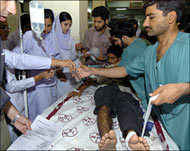Arrests follow Lahore blast
Pakistani police have detained more than a dozen people after a human bomber attacked a Shia mosque in the eastern city of Lahore killing several people.

The attack was the latest in a rising wave of sectarian bloodshed, bringing the death toll from attacks between rival Sunni and Shia communities to 171.
The suspected bomber, aged between 25 and 30, forced his way into the Kashmiryan mosque in the city’s congested Mochi Gate neighbourhood on Sunday.
He went into the hall and when the guards grabbed him he detonated the device carried in a bag. The blast killed two security guards and a 12-year old boy.
Earlier reports had quoted a Shia leader as saying seven people had been killed.
Investigators examined the body of the bomber whose head was severed after he detonated the bomb as worshippers prepared for evening prayers, an intelligence officer said on Monday.
Suspects questioned
Police questioned more than a dozen suspects detained in raids overnight, the officer said on condition of anonymity.
Shops and markets in the area remained closed as the dead were buried on Monday, residents said.
 |
|
Worshippers prepared for |
Sunday’s attack was the third bombing incident in October in the Punjab, Pakistan‘s most populous province.
A human bomb attack on 1 October in a Shia mosque in Sialkot city bordering India left 30 people dead, while a car bomb attack on a gathering of an outlawed Sunni party in southern Punjab’s city of Multan on 7 October killed 41 people.
In another attack in Karachi, the port city capital of southern Sindh province, two Sunni Muslim clerics were gunned down in a drive-by shooting on Saturday.
Fears
Authorities tightened security in Lahore, the Punjab capital and Pakistan‘s second largest city, the day after the human bomb attack, fearing protests and revenge attacks.
They have provided metal detectors to both Sunni and Shia mosques and religious schools.
“We are also installing closed-circuit televisions at sensitive religious places,” the official said.
|
“There is no Shia-Sunni rivalry in the country and leaders of both sects know that it is a conspiracy by those who want to plunge the country into instability” Shaikh Rashid, |
Provincial chief minister Chaudhry Pervez Elahi met security officials and religious scholars to discuss steps to maintain religious harmony during Ramadan starting this weekend, officials said.
Blame
Pakistan‘s majority Sunni and minority Shia communities largely live together in peace. Officials blame the tit-for-tat violence on fanatics from the two sects and the conflict has so far claimed more than 4,000 lives since the 80s.
Information Minister Shaikh Rashid said the recent surge in violence was on “a conspiracy” to create instability.
“There is no Shia-Sunni rivalry in the country and leaders of both sects know that it is a conspiracy by those who want to plunge the country into instability,” he said, without naming the suspected conspirators.